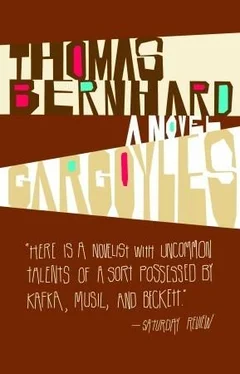Now I understood why the birds had been so frightened when I approached the cage, for from the very first moment I had thought that the birds were reacting unnaturally.
Their faces were all scratched up from capturing the birds, the miller’s son said. But now, with their experience, they would be able to process the remainder much faster and more easily that evening, and by tonight they would have perfect peace.… At first his father had thought of selling the birds alive to a collector, he said, but to find such a collector would have taken too much time and in the meanwhile they would probably have gone out of their minds. It was hard to get to a taxidermist, too; that was why they wanted to stuff the birds themselves in their leisure time. His uncle, the miller’s son said, had had nothing in his head but those birds. He had left a vast number of notes about his birds; undoubtedly they’d be valuable for a bird specialist. (“We’re all fond of making notes!” the miller’s son said.) The miller’s son picked up one of the handsome birds and held it high, so that we could see it well, and described its fine points. The young man apparently knew a good deal about exotic birds, I thought. Possibly all the inhabitants of the mill had concentrated on those birds. He was able to identify them all correctly. Some, he said, came from Asiatic countries, others from the Americas, and still others from Africa. Most of them, however, were Far Eastern island birds, with not a single one from Europe, he said. His uncle had often sat in the aviary for hours, but none of the birds had ever attacked him. They all had names like Kalahari, Malemba, Mitwaba, Ching-tou, Koejijang, Amoy, Druro, Drirari, Cochabamba, Carrizal, and so on. He said he knew the most remarkable facts about birds from the hundreds of ornithology books piled up in his uncle’s room.
But I could stand it no longer in the outbuilding where those dead birds lay on the board as on a bier. Above all the smell made it impossible for me to stay any longer, and I went out. I distracted the miller’s son, and thus myself, from the dead birds by starting to talk about life in the gorge. Did he know Prince Saurau? I asked. Yes, of course. Sometimes the prince unexpectedly came down into the gorge and visited the mill. He would sit down and say “incredible things.” He always came on foot. When there were parties in the castle, they could be heard down in the gorge, the laughter and music and the shouts of drunken people. But of late there had no longer been any parties at Hochgobernitz, the miller’s son said. The prince was keeping more and more to himself. They had received the mill as a gift from a Saurau who died in the last century. One evening at the castle the prince had made a wager that he would give the mill away directly if he could not shoot a certain twelve-pointer next day in the gorge. He had not shot the twelve-pointer and had forthwith given the mill to the Fochlers, who had been working it for two hundred years. “When the Sauraus make a promise, they keep it,” the miller’s son said. I remembered that my father had said the prince was as crazy as he was rich. My father came out as I approached the front door again with the miller’s son. The miller’s son laughed. Seeing him laughing that way, I also saw him making pseudo-geometric movements with his hands, the movements of twisting birds’ necks.
We now drove deep into the gorge. At its end, where it was darkest, my father said, we would leave the car and walk up to the castle. It was a rather dangerous path, hugging the left wall of the cliff, but he was used to it and I was young and athletic enough to walk it without fear. The prince expects my father every other Saturday. From the castle you could look down over the whole beautiful countryside, my father said. There was no other point like it in all of Styria for seeing the lay of the land. You could see all the adjacent provinces of Austria from Hochgobernitz, and toward the southeast you could look as far as Hungary. There was a good road leading up to the castle from the other side, but to reach it we would have had to make a detour of more than fifty miles by way of Planhütte.
As we approached the end of the gorge, we talked about the Fochler mill. My father described the miller as a heavy-set man of sixty who was simply rotting beneath the skin; he lay on the old sofa all the time, could no longer walk; and his wife, who to judge by the smell of her mouth was undergoing rapid degeneration of the lobes of her lungs, had water on the legs. A fat old wolfhound ran back and forth between the two, from her sofa to his and back again. Were it not that fresh apples were kept heaped in all the rooms, the smell of the two old people and the wolfhound would be unendurable. The miller’s right leg was decaying faster than his left; he would never stand again. “When a funeral procession moves through the gorge,” my father said, “it’s uncanny.” So he too had once witnessed a funeral in the gorge. The miller’s wife could stand on her legs only for a few moments at a time. The two of them lay in their room almost all the time and occupied themselves with their dog. The animal, because it never went out of the room, was absolutely dangerous in its derangement. One of the two, the wife or the husband, had to hold it whenever my father entered their room. Because of the screeching of the birds in the last few weeks the dog had gone racing back and forth between the two people “like mad.”
By disposing of the birds the people at the mill hoped above all to calm the dog, and thus the calm themselves. The miller had told my father that he had ordered the birds killed off chiefly because of the dog’s condition. Both of them, the miller and his wife, had alternately been holding the dog’s leash day and night. Since they had been condemned to their room for months by their illnesses, they had gradually lost control over their sons. The elder, whom the miller described as prone to violence — he had often hit his mother and threatened to kill both of them — had once attacked his father with a hoe and severely injured him. The boy who had shown me the dead birds in the outbuilding was a weakling, completely at the mercy of his older brother. All the people in the Fochler mill were feeble-minded, not insane, my father said.
At present one of the miller’s wife’s sisters was running the household. She was in Knittelfeld today.
There were four cows in the barn, my father said. I wondered what the cows grazed on, since there was nothing but forest all around.
I said that the “weak son” had shown me the dead birds in the outbuilding. It was curious, I remarked, that we should have come to the mill on the very day the birds had been killed, or rather were being killed.
All the while we were there, I said, I had been reminded of the funeral I had seen on my former visit to the mill.
Even the Fochlers had heard about the killing of the woman in Gradenberg — the murder, they kept saying. But my father had deliberately refrained from saying that he had been involved in the case.
A notary from Köflach wanted to buy their mill, my father said. To make a summer resort (!) out of it. The miller and his wife had mentioned the matter, but they had no intention of selling.
That was good spring water they had at the Fochler mill, my father said. Then he added: “There is an oil painting in the old Fochlers’ room.” He would guess it to be between three hundred and fifty and four hundred years old. It was not a painting of saints, he said. On the contrary, it represented two naked men standing with their backs to each other but their heads “completely twisted, face to face.” He had long admired the painting, he said, and had always associated a great variety of “rather gruesome” ideas with it. “If you take it down from the wall where it must have been hanging for hundreds of years and get it out of that horrible room and put it against a clean white wall, all its beauty would come out.” The painting was absolutely ugly and at the same time absolutely beautiful, he explained. “It’s beautiful because it’s true,” my father said.
Читать дальше












